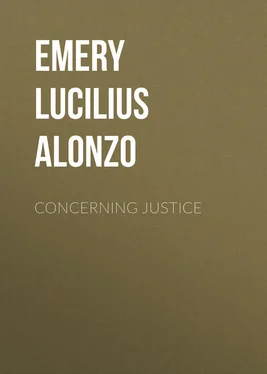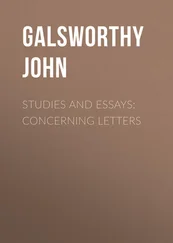Lucilius Emery - Concerning Justice
Здесь есть возможность читать онлайн «Lucilius Emery - Concerning Justice» — ознакомительный отрывок электронной книги совершенно бесплатно, а после прочтения отрывка купить полную версию. В некоторых случаях можно слушать аудио, скачать через торрент в формате fb2 и присутствует краткое содержание. Жанр: foreign_antique, foreign_prose, на английском языке. Описание произведения, (предисловие) а так же отзывы посетителей доступны на портале библиотеки ЛибКат.
- Название:Concerning Justice
- Автор:
- Жанр:
- Год:неизвестен
- ISBN:нет данных
- Рейтинг книги:3 / 5. Голосов: 1
-
Избранное:Добавить в избранное
- Отзывы:
-
Ваша оценка:
- 60
- 1
- 2
- 3
- 4
- 5
Concerning Justice: краткое содержание, описание и аннотация
Предлагаем к чтению аннотацию, описание, краткое содержание или предисловие (зависит от того, что написал сам автор книги «Concerning Justice»). Если вы не нашли необходимую информацию о книге — напишите в комментариях, мы постараемся отыскать её.
Concerning Justice — читать онлайн ознакомительный отрывок
Ниже представлен текст книги, разбитый по страницам. Система сохранения места последней прочитанной страницы, позволяет с удобством читать онлайн бесплатно книгу «Concerning Justice», без необходимости каждый раз заново искать на чём Вы остановились. Поставьте закладку, и сможете в любой момент перейти на страницу, на которой закончили чтение.
Интервал:
Закладка:
But the doctrine that justice is heaven born, superior to and controlling the opinions and wills of men, did not escape challenge even in ancient times. Those sects of philosophers known as Epicureans and Sophists, consistently with their theory of the nature of virtue in general, maintained that justice was merely a name for such conventions among men as they should adjudge best for their own utility and happiness. The most vigorous champion of this latter theory appears to have been one Carneades, a Greek philosopher of the second century B.C., said to have been the founder of the third Academy and expounder of the philosophy of probabilities and to have possessed the acutest mind of antiquity. In a course of lectures at Rome he stated the arguments for the orthodox view of justice and then boldly assumed to answer them and demonstrate that justice was not a virtue at all as virtue was defined by the philosophers, but was merely a convention; was what men should agree to be a sound basis for the maintenance of civil society, and hence that it varied with times, places, circumstances, and even opinions. This argument evidently had much effect upon public opinion, for Cato urged in the Senate that Carneades be banished because dangerous to the state.
So great was the influence of Carneades that a century later Cicero, a disciple of the Stoic school of philosophy, thought it necessary to refute him specifically as the chief heretic, and to uphold the orthodox theory against his arguments. Cicero denounced with eloquent warmth the doctrine that utility was the foundation of justice. He declared that, not utility, but nature, was the source of justice, that justice was a principle of nature, the ultimate principle behind all law. To abridge the familiar quotation from his "De Republica," "There is a law which is the same as true reason, accordant with nature, a law which is constant and eternal, which calls and commands to duty, which warns and terrifies men from the practice of deceit. This law is not one thing at Rome, another at Athens, but is eternal and immutable, the expression and command of Deity." In his treatise "De Legibus" he declared that men are born to justice; that right is established not by opinion but by nature; that all civil law is but the expression or application of this eternal law of nature; that the people or the prince may make laws but these have not the true character of law unless they be derived from the ultimate law; that the source and foundation of right law must be looked for in that supreme law which came into being ages before any state was formed.
This theory of the Stoics so eloquently urged by Cicero was practically the jus naturale of the Roman jurists of classical times, though more moderately expressed by them. It does not seem to have been wholly academic, but to have been actually applied at times. In his history of Rome, Mommsen relates that even during the nearly absolute sway of Sulla, after the fall of Marius, the Cornelian Laws enacted to deprive various Italian communities of their Roman franchise were ignored in judicial proceedings as null and void; also that, contrary to Sulla's decree, the jurists held that the franchise of citizenship was not forfeited by capture and sale into slavery during the civil war with Marius. Later, when the church became a power in the state there are instances where laws adjudged to be contrary to the laws of God were refused effect. In England as late as the middle of the 17th century Chief Justice Hobart, a judge of high repute, asserted that "even an act of Parliament made against natural equity, as to make a man judge in his own case, is void in itself for the laws of nature are immutable and they are the laws of laws." In the 18th century Blackstone assented to the doctrine of a jus naturale and wrote of it: "This law of nature being coeval with mankind and dictated by God himself is of course superior in obligation to any other… No human laws are of any validity if contrary to this, and such of them as are valid derive all their force and all their authority, mediately or immediately, from this original." True, Blackstone combated the doctrine that duly enacted statutes were to be held void if the judges thought them contrary to reason, but he admitted that that extreme doctrine was more generally held. In this country the doctrine of a higher law than the Constitution even, and to be obeyed rather than the Constitution and laws enacted in accordance therewith, has had and even now has earnest advocates.
But the contrary doctrine of Carneades and the Sophists would not down. After Cicero and the civilians, after Hobart and Blackstone, came our modern utilitarians, or sophists, Bentham, Mill, Austin, and others, who have vigorously maintained with weighty arguments the utilitarian theory of justice; and that theory is now generally accepted by lawyers and statesmen as at least the most workable theory in human affairs. There still exists, however, in the minds of many the belief that above and behind all the turmoil and strife of politics, all the flux and reflux of social movements and public sentiment, the confusion of enactments, amendments, and repeals of statutes, the swaying of judicial opinion, there is some law of nature or in nature, some criterion, which if ascertained and obeyed would be perfect justice.
This question of the origin, the foundation of justice, whether it be of God or of men, seems to have been much more debated than the question what is the nature of justice whatever its origin or foundation. Yet some attempts, other than those attributed to Socrates, have been made of old to give a definition of justice. The earliest description I have found is that of the early Pythagoreans, who, in accordance with their practise of symbolizing the virtues by geometrical figures, designated justice by the square, and the just man by the cube. Plato seems to have had a theory of justice when he wrote in the "Gorgias," "Nature herself intimates that it is just for the better to have more than the worse, the stronger than the weaker, and in many ways she shows that among men as well as among animals justice consists in the superior ruling over and having more than the inferior." In these days our first impulse may be to denounce Plato's statement as altogether wrong if not worse. We should remember, however, that Plato was not considering any altruistic virtue such as kindness, sympathy, benevolence, generosity and the like, but only what nature indicates to be the essential condition of successful association. Thus interpreted, are we prepared to confute the statement? Do we know of any state of society in human or animal life at any time, past or present, of which the contrary of Plato's statement is true?
But passing over all other attempts of the ancients to define justice, none of which seems to have been much regarded by contemporary opinion, I will only cite the most famous, that by Ulpian, the renowned jurist of the best period of Roman jurisprudence, whose writings were most drawn upon by the learned compilers of the Institutes and Digest of Justinian; viz., "Justitia est constans et perpetua voluntas jus suum cuique tribuendi," or "Justice is the constant and perpetual will to render to every one his right." This definition was adopted by the compilers as correct and made the introduction to the Institutes. It thus received the imperial sanction and was quoted wherever the law of Rome prevailed, down through medieval times and later, almost as if it were an inspired or at least authoritative definition not to be questioned. But notwithstanding the acclaim with which this definition was hailed, I question that it was any improvement on that of Aristotle, who tersely defined justice as "that virtue of the soul which is distributive according to desert." Indeed, I think Aristotle was nearer the mark.
Читать дальшеИнтервал:
Закладка:
Похожие книги на «Concerning Justice»
Представляем Вашему вниманию похожие книги на «Concerning Justice» списком для выбора. Мы отобрали схожую по названию и смыслу литературу в надежде предоставить читателям больше вариантов отыскать новые, интересные, ещё непрочитанные произведения.
Обсуждение, отзывы о книге «Concerning Justice» и просто собственные мнения читателей. Оставьте ваши комментарии, напишите, что Вы думаете о произведении, его смысле или главных героях. Укажите что конкретно понравилось, а что нет, и почему Вы так считаете.












